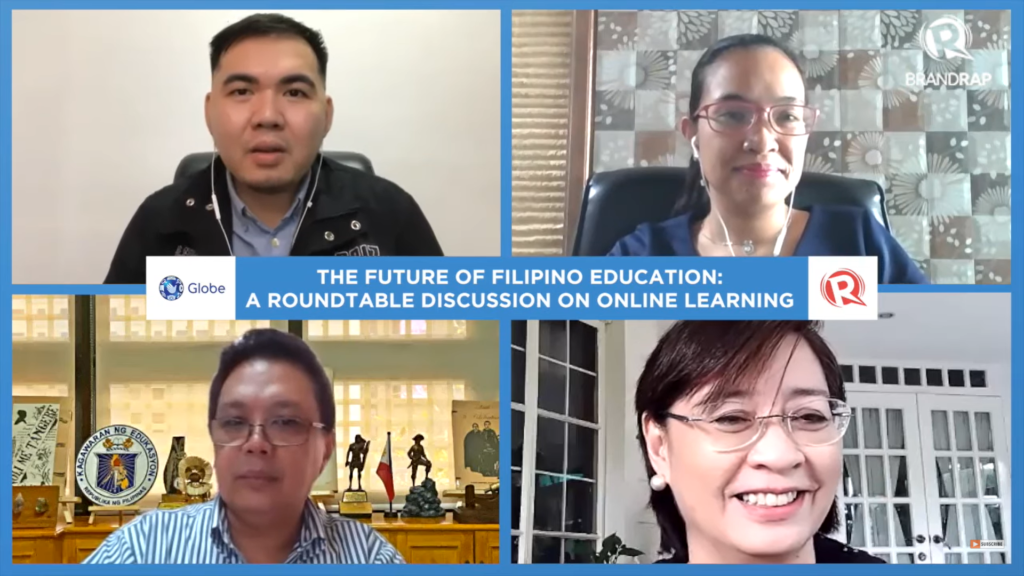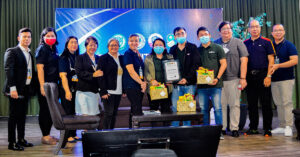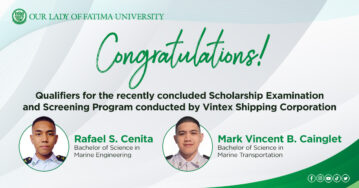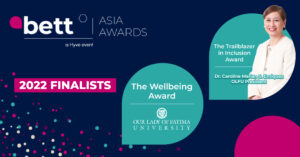Educators and students in the country have taken the big shift to digital learning. This, of course, did not appear to be an easy task as most schools in the Philippines had been more accustomed to face-to-face classes.
Because of this, the adaptability of schools and sustainability of distance learning models in the country, including challenges, have since become main topics of progressive discussions between key players as the entire education sector takes steps forward in the new school year.
On 18 August 2020, Our Lady of Fatima University (OLFU) President Dr. Caroline Marian S. Enriquez, who is also the current President of the Philippine Association of Colleges and Universities (PACU), joined an enriching roundtable discussion on online learning with top Philippine education officials. The event, titled “The Future of Filipino Education”, was hosted by Globe Telecom and Rappler.
Joining Dr. Enriquez in the panel were Department of Education (DepEd) Undersecretary Alain Pascua and Commission on Higher Education (CHED) Executive Director, Atty. Cinderella Filipina Benitez-Jaro. Moderating the session was Globe Segment Head for Education, Mark Payumo Abalos.
The ball started rolling with a question on the current situation: “How are schools adapting to a more digital landscape and what barriers stand in their way?” Usec. Pascua elaborated on the various projects and initiatives that they have launched in DepEd, such as “Public Schools of the Future”, the Digital Rise program, which “prioritizes the use of technology for the learning and teaching process,” and the ongoing Interconnectivity program, which aims to connect public schools through a public education network.
On the other hand, for higher education, Atty. Jaro said that the transition to full online delivery of education did not pose much difficulty as some institutions have already begun employing blended learning methods even before the pandemic.
For Dr. Enriquez, one of the challenges encountered by the private education sector circle around dealing with student and parents’ hesitant mindset towards online or flexible learning “as the best available alternative solution to delivering education now.”
“It’s difficult to sell the idea of learning digitally or through learning packets, such as remoting, especially so because we’re so used to the notion that learning can only happen within the confines of the classroom, within walls,” she said.
Dr. Enriquez also added that families encounter dwindling financial resources due to the pandemic’s effects on the workforce and the economy. Because of this lack, education unfortunately becomes less of a priority.
The common challenge between these three sub-sectors is the accessibility to stable internet connection for both schools and students. On the tertiary level, Atty. Jaro said that while many colleges and universities are capable of delivering education online, the difficulty lies with students’ limited access to stable and sufficient internet connection.
Discussing long-term solutions, DepED and CHED also shared their measures and milestones moving forward. Usec. Pascua elaborated on the DepEd Commons, which was already being planned even before the pandemic struck; due to the situation, the Department had to launch it right away. It is a common platform where learning materials, textbooks, and other resources can be accessed by learners. They are currently planning more modules, as well as DepEd TV and audio episodes. He likewise talked about the upcoming launch of the DepEd Learning Management System.
With the unexpected situation pushing them to fulfill their milestones quickly, the DepEd continuously explores opportunities of collaboration with the private sector and other government agencies.
For higher education, Atty. Jaro talked more about the PHL CHED Connect, an online learning platform with open educational resources, and learning resources from leading universities and international partners. The Commission is currently holding trainings for faculty members. Moreover, it is providing grants to higher education institutions to conduct their own trainings and develop their offline resources.
On digital strategies of the private school sector in the transition, Dr. Enriquez said that these institutions are “very agile and flexible when it comes to addressing institutional operations”; it is cash flow that set the limits. Key investments include a “good learning management system” and “equally good content,” as well as “good internet connectivity.” Other helpful apps, platforms, and software are also employed by schools.
“We have created a new business model,” Dr. Enriquez said. From the traditional “brick-and-mortar” setup, institutions have now transitioned to become “virtual universities,” its functions and services now becoming available online. “Digital transformation is here to stay. It is now part of the DNA of universities and colleges; it is part of the DNA of education,” she averred.
Much has been discussed in this online roundtable, including the ways how internet service providers can aid the education sector in their efforts toward digital transformation, insights on academic freeze, recommendations for fellow educators, and long-term visions for Filipino education.
“Never in Philippine history did we ever put or subject the educational process as one big experiment,” Dr. Enriquez said as she began to describe her own vision. Looking for solutions in this digital shift, leaders and educators, as well as other stakeholders, took an all-hands-on-deck approach to “make Filipino education as resilient as can be.”
She suggested that the government “could implement or create policy guidelines or frameworks that are not too restrictive.” This way, the education sector “could be agile yet innovative yet mindful of quality.”
The OLFU and PACU president also said that she envisions a Philippine education system that is still anchored on the traditional face-to-face set up; yet, at the same time, the virtual delivery of education is also normalized and already integrated in the landscape.
“Universities and institutions should be built to last or moreso, built to adapt so that we all learn from the experiences of today and be able to find better ways of delivering education using the experiences that we have now,” she said.
Dr. Enriquez then closed with striking words: “This COVID-19, scenario, although it has been very challenging for us, it is also a big opportunity for us to change our ways. Let our hardships be a lesson for everyone, let us start preparing for the future now.”
The full roundtable session is available on Rappler’s official Facebook page.



